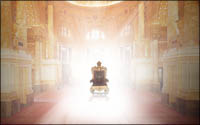 After the death of Solomon and the tragic split of his empire into two estranged kingdoms, Judea was left with only a quarter of the population and a small, almost defenseless, generally land-bound portion of the land to the south. However, it had three things in its favor:
After the death of Solomon and the tragic split of his empire into two estranged kingdoms, Judea was left with only a quarter of the population and a small, almost defenseless, generally land-bound portion of the land to the south. However, it had three things in its favor:
1) It was heir to dynasty to the House of David, which solidified the government in a way that the Kingdom of Israel never experienced.
2) It had the Temple, which was in its capital city, Jerusalem. The Temple served as a breakwater against the rising tides of alien influences, and weakened the hold that idolatry otherwise would have had over the people.
3) It had the prophets. Even though the kingdom of Israel also had prophets, the influence of the prophets in Judea was much greater.
All of those factors combined to create a protective coating that did not allow Judea to slip away in the same fashion that Israel did. Even when it would be destroyed, its Temple burned to the ground and its people taken into exile, the Jewish people would survive because the tradition of Torah and belief remained intact. Despite the fact that vast numbers of individual Jews would be lost, the centrality of Jewish life and its future in the hostile environment of Exile and Diaspora would live on.
Children Undo What their Fathers Did
We will see a pattern with the Judean kings: children undoing what their father’s did.
If the father was an idolater, the next king, his son, was righteous. If he was righteous, then his son became an idolater. Sometimes it was the grandson, not the son, who reversed direction, but with few exceptions this was the pattern.
David and Solomon were both good, despite Solomon’s failures at the end. However, Solomon’s son Rehoboam was a disaster. His son Avijam was even worse. He was the first outright idolater in the Davidic line. However, he was followed by the righteous king, Asa.
Asa restored what David attempted to do, making a clean sweep of idolatry and clearing out pockets of prostitution (IKings 15:12-13).
Asa was succeeded by Jehoshaphat. He was a righteous king who continued his father’s ways. However, toward the end of his 25-year reign he made a disastrous mistake, and joined forces in a losing war with the wicked Ahab of the Northern Kingdom (see I Kings 22).
After the war, Judea was very weak. One of the few territories it retained dominion over was Edom, located to the south, with access to a seaport on the Red Sea in what is modern day Eilat. Edom revolted and Judea lost control of its southern seaport. That set in motion a serious of rebellions that left Judea weaker than ever and on the verge of total disintegration.
The Disaster of Athaliah
Compounding matters, as part of Jehoshaphat’s original alliance with Israel he arranged a marriage between his son, Jehoram, and Ahab’s daughter, Athaliah. Consequently, the queen of Judea was now the blood relative of Ahab, the ruler of Israel.
Athaliah would become the single greatest disaster to strike Judea.
She came along with all the terrible things her scheming mother Jezebel embodied, such as her pagan ideas, idol worship as well as her immorality, hunger for power, plotting and cruelty. Like her mother, she was also adept at all types of court intrigue.
Jehoram had little chance against such a domineering, manipulative woman. Indeed, he quickly slipped into idolatrous ways after marrying her, despite the fact that his father and grandfather had fought with all their might to eliminate such ways from Judea. He not only served idols himself but he reinstituted it among the people, turning the southern kingdom into a replica of its northern, idolatrous brother.
It is hard to comprehend how Jehoshaphat agreed to such a marriage in the first place. He was a righteous king. However, there were undoubtedly political and other reasons – perhaps even a certain amount of naiveté, also – in his thinking. He thought he would reform her. Many good people fall prey to that naiveté. They honestly believe there is no person or situation they cannot handle.
After only eight years as king, Jehoram died and his son Ahaziah took over at the age of 22. At the beginning of his reign he went to visit the king of Israel, and walked into the revolution there when Jehu was killing out the House of Ahab. While there he himself was assassinated. There are commentators who say that his mother Athaliah plotted the assassination.
Athaliah’s now sought to kill anyone related to the Davidic line in the hope of becoming the undisputed ruler in Judea. She almost succeeded. However, one child escaped the slaughter, her one-year old grandson Joash (son of Ahaziah). Before she could kill him, his nurse hid him and then helped him escape to safety. He eventually found refuge with the High Priest, Jehoiada, and remained hidden for six years.
Athaliah rule was characterized by pandemonium and chaos. The Temple was under siege. There were idols all over the place, immorality was rampant and taxes were obscenely high. The entire country came to a standstill.
There were only a few people, priest and prophets loyal to the house of David. Together, they conspired against Athaliah and had her assassinated. It was a very bloody period. As we said, coups, plots and assassinations were the norm in non-Jewish nations and the idolatrous kingdom of Israel, but not in Judea. However, the assassination of Athaliah was an exception to the rule.
Joash was made king at the age of seven. He was ruler in name only for the first few years while Jehoiada in effect ran the country. When the young king matured, Jehoiada dutifully handed the reins to him.
Joash ruled 40 years. He was one of the great and righteous kings. During his reign, he not only destroyed idol worship, but refurbished the Temple for the first time in 200 years. At the same time, Joash defeated Aram and rebuilt Judea into formidable power again.
Amaziah: The Price of not Paying Heed to the Prophet
When he died his son Amaziah took over. He was a good king like his father. Among his successes was the reconquering of Edom and the opening of the southern seaport. Then he did something no other Judean king attempted: forcibly reunite the Jewish world by invading Israel.
Despite good intentions, the prophet said not to do so (II Chronicles 25:8-9). God would not be with him. Amaziah went to war against Israel. He was even captured. And to make their point stronger, they came to Jerusalem and tore down part of its walls, which was a great humiliation for the Holy City. It was like publicly burning the flag of the enemy today.
They also took away all the gold and silver that had been accumulated in Jerusalem over the years. The treasure of the Temple itself was plundered and taken back to Samaria as booty.
Uzziah & the Great Earthquake
Amaziah was eventually assassinated by a group of generals who felt they could run the country better. When that happened the people demanded that the next king be from the House of David. They did not want to follow the ways of the Northern Kingdom where the generals responsible for the assassination took the crown for themselves. That did not happen here. Instead, his 16-year old son, Azariah, became king (II Kings 14:21). He is more famously known as Uzziah, and was king for the next 52 years (II Kings 15:2).
Uzziah was great and pious king. However, he also fell to the blandishments of power, because just as his father ignored the prophets he ignored the priests by demanding to serve as the High Priest.
That led to a landmark event. When Uzziah came into the Temple to offer incense there was an enormous earthquake (Zechariah 14:5). He also became leprous (II Chronicles 26:19). Greater than the physical aftershocks were the emotional-spiritual ones. It was such a momentous event that subsequent years were dated from it: for example, “…two years before the earthquake” (Amos 1:1). People counted time from that event.
It was also the last attempt of any of the Judean kings to interfere with the affairs of the priesthood. In the Second Temple era the reverse would take place: the priesthood (the Hasmoneans) would interfere with the kingship. However, no more would kings attempt to do the jobs of priests. The lesson of what happened to Uzziah was so emblazoned on their psyches that the issue was never raised again.
When Uzziah died his son Jotham became king (II Kings 15:7). He attempted to follow his righteous father in the sense of not allowing idolatry; he also rebuilt new gates for the Temple. However, he was totally ineffective to stem the aggression from Aram and Israel. It undermined his entire reign.
When he died, after a 16-year reign, his son Ahaz came to power and reverted the nation back to idolatry. He undid everything that had been done before him. It was the lowest low point in the kingdom of Judea until the destruction of the Temple. Judea was small, idolatrous, powerless and surrounded by enemies. It looked like the end.
However, as we will see, it was not so. Ahaz himself would give birth to one of the greatest kings even, Hezekiah, a man the rabbis said was great enough to be the Messiah.











